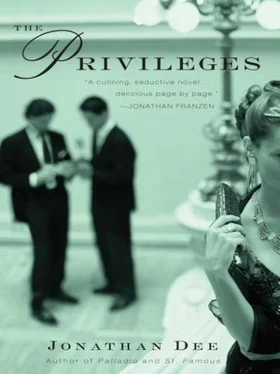They all got high in the car again and two hours later they were in Amagansett. April hit the security code and they were in. The streets were empty and when the sky darkened they didn’t see lights coming on in any of the neighboring houses.
There was a lot of alcohol in the house, which helped them avoid peaking too drastically. Their only foray outside was down to the beach at night, just to listen to the receding water and watch the stars. April felt very happy. Like being a kid: finding a hiding place in your own home. They all got briefly excited when they saw, way way down the beach, a bonfire burning in the sand; but it was freezing and they weren’t really dressed right so they didn’t go check it out. At one point April and one of the Russians — they were Russian, she’d decided — were alone in the pool house, and they decided to try to have sex, but it was pretty much a nonstarter.
When they left to drive back to the city, the last few bottles in hand, April turned to look at the place one last time and consoled herself that not a lot had gotten damaged or broken, though the whole first floor just looked vaguely grimy. Even the walls. Someone would come and clean it, though. Dmitri drove while the others tried not to fall asleep; they were still on Route 15 when Dmitri, who was trying to text someone with one hand while passing another car, hit a van traveling in the other direction. The van managed to turn a little so they didn’t hit head-on; it skidded over to the shoulder and then fell lazily and loudly onto its side.
None of them was wearing a seat belt, but Dmitri was the one who was truly fucked up. Somehow the rest of them were standing outside the ruined car now — the two chicks were wailing — and looking curiously through the driver’s-side window at Dmitri, whose head rested on the steering wheel and was turned so that you couldn’t see his face, which was probably just as well. No sirens yet. Where were they? April started to get scared. She had lots of shameful thoughts in succession: Thank God it wasn’t her car. Thank God she wasn’t driving. Still, this was not going to be good. It was all going to fall on her, because they’d all been at her place, and because who were these people, really? Hers was the only name that was going to give anybody anything to latch on to. She looked again at the door to the van, which had not moved. It said Sagaponack Nursery on it. Nursery like trees, she told herself. Not like nursery school. Suddenly she wanted so badly to be ten years old again. No more pretending now. Her own phone had been dead for days. “Who has a phone?” she asked the others, but they were like statues, like garden gnomes. “A phone!” Finally, desperate and shaking, she took two steps forward and, holding her breath, reached through the shattered window, pulled the cell phone out of Dmitri’s clenched hand, wiped it on her jacket, and called her mother.
The fair was held in the McCormick Place convention center just off Lake Shore Drive; Jonas and Nikki had to pay thirty-five bucks each just to get in. A number of galleries from all over the Midwest, and four or five from New York, had paid for and staked out square footage inside. Little pamphlets on draped card tables held one-page biographies of the artists, like trading cards for mental illness; Jonas picked up as many of them as he could find. The rule of thumb seemed to be that the farther a particular artist’s own mind had pushed him toward society’s border, the more you could charge for his work. It was somehow revolting and thrilling at the same time. A few dead outsiders had become stars, like Henry Darger or Martin Ramirez. Maybe this was no different, Jonas thought, from the way the art establishment had processed, say, Van Gogh. But everyone moving through the building’s vast warren of temporary drywall seemed so loathsome to him that it was hard to judge. He was surprised how old they were, ten or twenty years older than him at least, if you discounted the occasional baby in a stroller — smug bohemian speculators, praising everything noisily in overcompensation for the fact that they were no match for the magnificent strangeness of what hung right in front of their eyes.
He and Nikki caught a break when they stopped at Larry Masters’s booth and found that Masters himself had gone to lunch; they left the framed Strauss sketch with an indifferent gallery assistant and hurried away. Nikki had a list on an index card of particular artists Agnew wanted her to look for; he wanted to know what their work was selling for and also, more problematically, camera-phone shots of the work itself, but there were security guards here and there and Nikki, who was afraid of cops even of the rental variety, could sneak a shot only occasionally. She took copious notes, though, and collected all the pamphlets and price lists. It wasn’t really a two-person job, so Jonas just walked around following whatever caught his eye. He squeezed through a pack of reverent yuppies for a look at those great iconic deer in the work of Martin Ramirez, who had lived on the streets of LA apparently incapable of so much as a conversation and whose asylum warders at first tried to stop him from drawing on the grounds that it was unhealthy. That stuff was going for tens of thousands now. There were diagrams of nonexistent machines, maps of nonexistent places, ferociously detailed charts filled with dates and numbers in an order that you were never, ever going to divine. There was a grown man named Morton Bartlett who had spent decades photographing his own doll collection. Jonas was just about to start looking for Nikki again when he saw a group of charcoal portraits, if you could call them portraits, of people screaming. Were they screaming, though? Their mouths were open. Maybe they were just trying to speak. Their eyes were always neutral, and their necks were thin and cylindrical, like plant stalks almost. Sometimes there was a background, slight variations on what Jonas ultimately decided was a gas station, or at least looked like one; there were also some simply drawn dogs, and boxlike forms that may have been televisions, though, if so, they were never turned on. But it was the faces, the upturned open mouths, that were most ambiguous and obsessive.
The number written on a sticker beside the portraits was 12; Jonas checked the gallery pamphlet and saw prices listed but no biography of the artist, who was named Joseph Novak. When he asked the stout, short-haired woman at the card table if she could tell him anything more, she sized him up and smiled with a touch too much patience, probably, he realized, because his youth and appearance didn’t suggest that he was in a position to buy anything.
“Joseph is new to us,” said the woman; she didn’t introduce herself, but she seemed to Jonas like the gallery owner, in which case her name was Margo. “He — well, I don’t want to get into specifics, but he was in an institution for several years, in the wake of a crime he admitted to committing as a minor; like a lot of artists he really only began drawing when his freedom was taken away, but he has kept up the pace since his release.”
“So he’s still working on this series?” Jonas asked.
Margo considered how to answer. “Presumably,” she said. “I mean, ‘series’ is a word you could use. I’ve only met Joseph one time myself. These drawings came to me via a brother of his in Kenosha who had a suspicion they might be worth something. Joseph himself is — well, communication is difficult, let’s say that.”
Jonas stared at the drawings for a while longer. They had a broken, smudged line, like if you extracted the lead from a pencil and just tried to hold it in your hand. They were figurative and thus a little less grotesquely original than some of the other stuff there; still, the longer he stared at the faces, the more excitement he felt, like what he was seeing was something that had never even been looked at before. He tried to forget what little Margo had just told him about the artist himself, but that was difficult to do. A while later Nikki was walking past and spotted him. He asked her right away if the name Joseph Novak was on Agnew’s list and felt a small thrill when the answer was no. “How about you?” he said. “See anything interesting?”
Читать дальше












